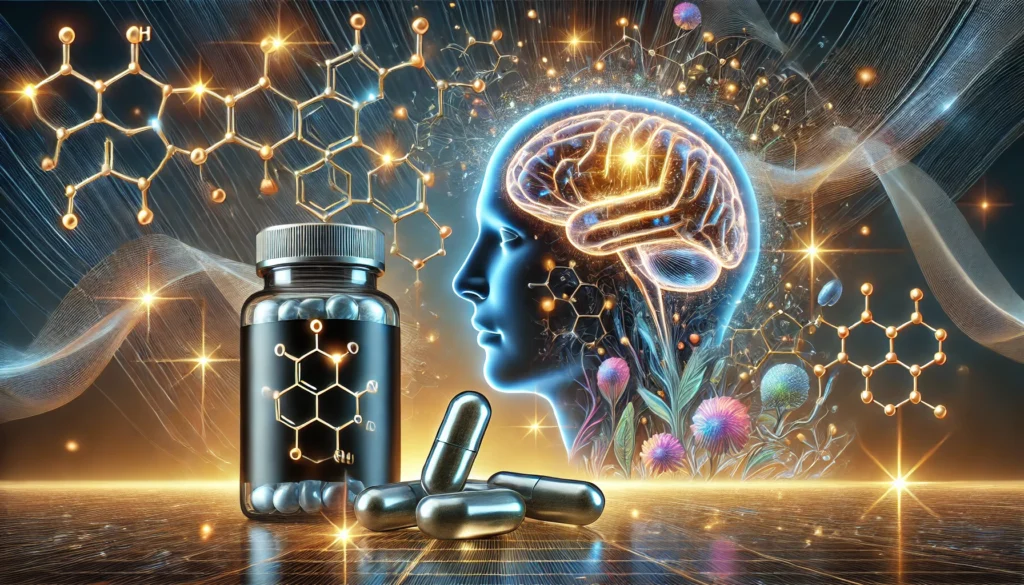In the realm of nootropic supplements, Theanine is emerging as a compound of interest. Theanine seems to be drawing the attention of individuals keen on enhancing cognitive functions, such as alertness, focus, and overall brain health. Predominantly found in tea leaves, particularly green tea, Theanine (specifically L-theanine) has garnered attention for its potential health benefits, optimal dosages, side effects, and interactions with other substances. This article delves into the scientific intricacies of Theanine, providing a comprehensive overview for those considering its responsible use.
You May Also Like:
Nature of Theanine
Theanine is a naturally occurring amino acid that is mostly found in tea leaves. Green tea is one of the most well-known sources of this amino acid. It is also known by a similar name, L-Theanine. L-theanine is classified as a non-proteinogenic amino acid because, in contrast to most other amino acids, it does not aid in the synthesis of proteins in the body. It differs from the usual dietary amino acids in that it is only found in tea leaves and some types of mushrooms.
Theanine’s popularity as a dietary supplement is influenced by the fact that is occurs naturally. This aspect seems to be particularly attractive to individuals looking for an alternative to artificial nootropics. The fact that is springs from a natural source and L-theanine’s capacity to alter brain chemistry and pass the blood-brain barrier make it a promising substance for improving mental health and function.

Health Benefits of Theanine
Theanine’s impact on brain health and cognitive functions is profound and multifaceted. Its ability to modulate neurotransmitter levels leads to various neurological benefits:
- Enhanced Cognitive Function: Theanine promotes the brain’s generation of alpha waves, which helps to create a calm but alert state. Better cognitive abilities, including sharper focus, longer attention spans, and higher learning capacities, are supported by this state. Because increased alpha brain wave activity is linked to improved creativity and problem-solving skills, Theanine is an effective supplement for mental endurance and creative work.
- Stress and Anxiety Reduction: Theanine’s ability to modulate neurotransmitters, such as GABA, dopamine, and serotonin, is essential to its calming effects. These neurotransmitters keep the equilibrium of mood. Theanine’s anxiolytic qualities stem from its capacity to raise GABA levels, which lessens stress and anxiety symptoms without having the sedative side effects of many anti-anxiety drugs. This anxiety reduction helps you stay focused and productive.
- Improved Sleep Quality: Although Theanine does not directly induce sleep, its effects on relaxation can help enhance the quality of sleep. It may make it easier for people to fall asleep and have more restful sleep by lowering anxiety and encouraging relaxation. Higher-quality sleep promotes memory consolidation, cognitive performance, and general brain health.
- Neuroprotective Effects: Antioxidant qualities shown by Theanine may have neuroprotective effects. It is essential for avoiding neuronal damage and promoting cognitive function because of its capacity to fight oxidative stress and inflammation within the brain. In addition to lowering the risk of neurodegenerative illnesses, these antioxidant actions may also help the brain operate better overall as the people who consume it age.
- Synergistic Effects with Caffeine: L-theanine and caffeine, which are frequently present in teas, have been demonstrated to have synergistic effects on cognitive function. L-theanine can boost caffeine’s benefits on alertness and attention while counteracting some of its negative side effects, like jitteriness. This combination eliminates the negative effects of excessive caffeine consumption while providing a smoother, longer-lasting boost to cognitive function.

Chemistry of Theanine
Because of its distinct structural identity, Theanine, which is mostly known in the biochemical community in its bioactive form as Theanine, stands out. It is an amino acid analog of glutamine and glutamate that is unique in that it is rarely found in sources other than proteins found in food. The structural similarity between Theanine and glutamate, a neurotransmitter involved in neuronal activation, is crucial for its capacity to pass through the blood-brain barrier. This is an accomplishment that is difficult for many substances to accomplish. Its capacity to do so is essential to its effects on the brain and signals the start of its nootropic trip. L-theanine differs from many other dietary supplements in that its chemical structure allows it to interact with brain chemistry and directly affect neural functions.
Physiological Mechanism of Action
L-theanine’s main mechanism of action is the regulation of neurotransmitter levels. L-theanine may also have neuroprotective effects due to its interaction with the neurotransmitter system. Its potential to reduce stress-induced brain damage and boost mental resilience through neurotransmitter activity modulation adds to its allure as a dietary supplement for improving cognition and brain health in general.
Optimal Dosage of Theanine
To maximize the benefits of Theanine while reducing any potential negative effects, the ideal dosage must be established. Research studies often employ daily doses between 100 and 400 mg, with 200 mg frequently mentioned as a safe and beneficial amount for improving cognitive function. Individual tolerance and response, however, can differ; therefore, it’s important you start with a lower dose and increase it as necessary.

Side Effects of Theanine
L-theanine is widely regarded for its safety and low incidence of side effects, especially when consumed in amounts typically found in tea. However, as with any supplement, there are potential side effects, particularly at higher doses. These can include:
- Headache: Some individuals may experience headaches after consuming L-theanine, although this is relatively rare.
- Dizziness: Higher doses of L-theanine can lead to feelings of dizziness in sensitive individuals.
- Gastrointestinal Issues: Nausea and upset stomach are potential side effects, especially when Theanine is taken on an empty stomach or in large doses.
- Sleepiness: Due to its relaxing effects, excessive intake of Theanine might lead to excessive drowsiness, particularly in individuals who are sensitive to its effects.
It’s important that you note that these side effects are generally mild and not commonly reported. Most people can take Theanine without experiencing adverse effects, particularly when consumed within the recommended dosage range.

Potential Substance Interactions with Theanine
While Theanine is safe for most people, it can interact with certain substances, modifying their effects:
- Caffeine: Theanine and caffeine are often consumed together in teas, and their interaction can enhance cognitive performance while reducing the jitteriness and anxiety sometimes associated with caffeine intake. However, this synergistic effect might not be desirable for everyone, especially those sensitive to caffeine or those looking to avoid stimulatory effects.
- Sedatives and Depressants: Because Theanine has relaxing and potentially sedative effects, it may enhance the effects of sedative medications or substances, including benzodiazepines, sleep aids, and alcohol. This can lead to increased drowsiness and a heightened risk of sedation, which could be unsafe in certain situations, such as driving.
- Stimulant Medications: While the interaction is less documented, there’s potential for Theanine to modulate the effects of stimulant medications used for attention deficit hyperactivity disorder (ADHD) and other conditions. This could theoretically enhance or diminish the medication’s effectiveness, warranting caution and consultation with a healthcare provider for those of who with an ADHD diagnosis and prescription for medication related to the disorder.
- Blood Pressure Medications: Theanine lowers blood pressure in some individuals. When taken in conjunction with blood pressure-lowering medications, it might cause blood pressure to drop too low, warranting careful monitoring and possibly adjustment of medication dosages.
As with any supplement, it’s safe and recommended for you to consult with a healthcare provider before adding Theanine to your regimen, especially if you’re taking medication or have underlying health conditions. This ensures safe use and minimizes the risk of adverse interactions and side effects.

Best Practices for Responsible Use
It’s important for anyone interested in adding Theanine to their nootropic regimen to use it responsibly. This entails assessing tolerance by starting with a low dose, speaking with a healthcare professional, particularly if you have any pre-existing problems or are taking medication, and keeping an eye out for any negative interactions or side effects.
It’s also a good idea to think about Theanine’s origins. Although there are supplements available, drinking tea provides a natural dose of Theanine along with other health-promoting chemicals like catechins.
Theanine: Conclusion
Theanine is one of numerous chemicals that exist within teas that have nutritional benefits and more, as we learned in this article. It is a practical and safe choice of a supplement for those looking for a naturally occurring nootropic, which also happens to be an amino acid. The applications for improvement to your health are substantial, from sleep quality, production of alpha (brain) waves, the production of essential neurochemicals, and more. There is a growing scientific consensus that Theanine is helpful and useful, especially for the brain and nervous system. Please use this and other resources to support your research as you choose whether to add this to your lifestyle choices to improve your health.

References:
- “What is L-theanine?” Retrieved from: https://www.medicalnewstoday.com/articles/324120
- “Theanine – Uses, Side Effects, and More.” Retrieved from: https://www.webmd.com/vitamins/ai/ingredientmono-1053/theanine
- “Here’s What You Need To Know About L-Theanine.” Retrieved from: https://health.clevelandclinic.org/l-theanine
Important Note: The information contained in this article is for general informational purposes only, and should not be construed as health or medical advice, nor is it intended to diagnose, prevent, treat, or cure any disease or health condition. Before embarking on any diet, fitness regimen, or program of nutritional supplementation, it is advisable to consult your healthcare professional in order to determine its safety and probable efficacy in terms of your individual state of health.
Regarding Nutritional Supplements Or Other Non-Prescription Health Products: If any nutritional supplements or other non-prescription health products are mentioned in the foregoing article, any claims or statements made about them have not been evaluated by the U.S. Food and Drug Administration, and such nutritional supplements or other health products are not intended to diagnose, treat, cure, or prevent any disease.


